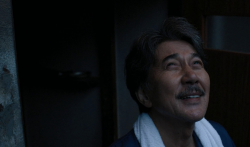This week, Oscar Wilde is on trial in the Black Box Theater.
From Thursday, Oct. 28 to Saturday, Nov. 6, Georgetown’s Nomadic Theatre is staging Gross Indecency: The Three Trials of Oscar Wilde, a play by Moisés Kaufman that portrays the Victorian playwright’s prosecution for homosexual acts with an aristocrat’s son.
Kaufman brilliantly weaves firsthand accounts, memoirs, legal documents, and Wilde’s own texts to fabricate his courtroom drama. Given such an intimate view of the proceedings, the audience feels like court spectators, members of the press, jurors and defendants as the play unfolds.
This connection to the trial is intensified by the stylized, minimal set design. The stage is sparsely decorated with straight-backed chairs and mobile platforms that obscure the boundary between the audience and the performers. The platforms allow for shifting and movement on the set, and director Danny Rivera (COL ’11) uses the differences in distances and elevations between the actors to reflect power dynamics. The moving platforms are effective during scenes that involve dialogue, but in some instances, the shifts seem like contrived attempts to give movement to an otherwise static scene.


The minimal approach to set design is balanced nicely by the broad but believable range of emotions demonstrated by the play’s lead actors. Shawn Summers (COL ’12) vibrantly portrays the persecuted Oscar Wilde. He is particularly good at embodying the aloof, droll attitude of the poet, but also in allowing for cracks in that façade to appear and his vulnerability to show through. Ryan Merlini’s (COL ’14) young Lord Alfred Douglas, Wilde’s muse and lover, is a little rough but very genuine, although there is a great moment in the play when we glimpse the manipulative, self-serving side of the young man.
Sarah Robbins (SFS ’12) as attorney Carson adds wit and interest to her cross-examination of Wilde. Other light moments include a hilarious depiction of Queen Victoria, the appearance of a raucous prostitute, and the testimony of Wilde’s young lovers.
Nomadic has great material to work with in Kaufman’s 1997 play. Early in the play, it becomes clear that Oscar Wilde the man is not truly the focus of the trial. What is really the subject for debate is art, the relationship between art and morality, and the role of art in the Victorian society. Can art be good and evil? The prosecution of a homosexual artist for his “deviant” acts is not a comment on Victorian England’s sexual mores. Rather, it is a statement that forces the audience to consider whether excellent art absolves its artist of “disdainful” personal qualities.
Rivera’s interpretation tackles all these heady topics, and he works to make sure that the superb text of the play shines through. The production is simple, predominantly relying on the original narration, monologue, and dialogue, with little physical action between. In his director’s note, Rivera encourages the audience to listen closely to appreciate each character’s nuanced stance on the play’s central issues.
Unfortunately, Rivera’s reliance on period accents to differentiate characters was problematic. It is very difficult to expect each actor to successfully switch between Victorian-era accents based on regional and class origins, and their struggle to do so draws attention away from the script.
It is rare to find an enjoyable, engaging play that also adeptly raises moral, political, and philosophical questions. Nomadic achieves that goal with Gross Indecency, a play that entertains while forcing its audience to reconsider the relationships between art, morality, and sexuality. Wilde himself would be proud.




